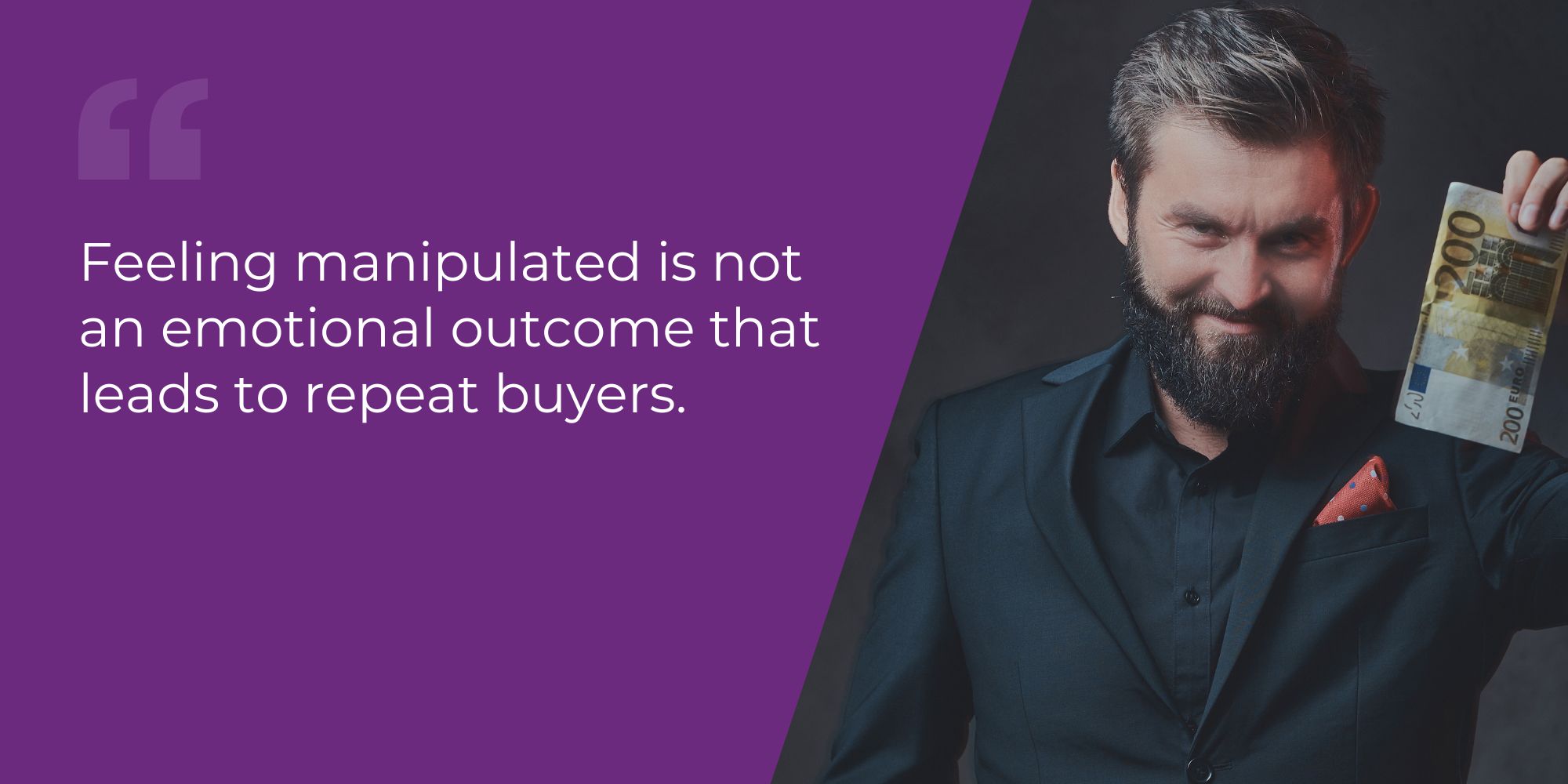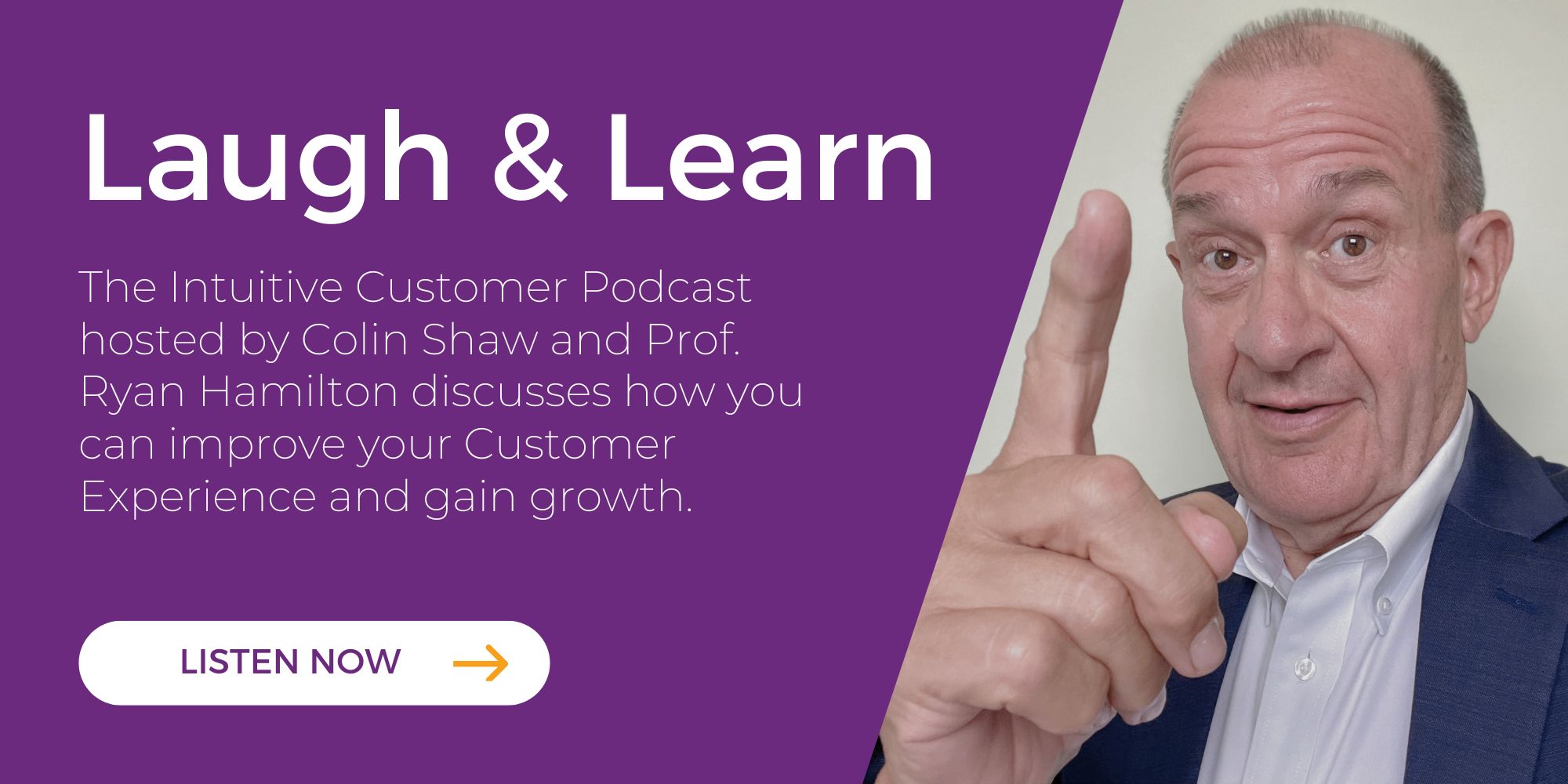Learn more about Colin Shaw: Join over 85,000 people on our LinkedIn Newsletter list or visit our website for more great podcast episodes.
Listen to the podcast:
Have you ever had a moment where you wonder if you should be doing what you are doing? Recently, I did. One of our podcast listeners questioned the ethics of leveraging a sense of urgency as a marketing tactic, which had me pondering the meaning of life, the universe, and everything.
Daniel Bisett, partner and CXO at WeRock DM, a digital marketing agency in Austin, TX, sent us a video as part of our None of Us Are as Clever as All of Us feature for the podcast. His message got me thinking about marketing, and since many of you are in the field, I wanted to share it here as well.
Here is what Bisett had to say:
Bisett says that he watched the documentary “The Social Dilemma” and began questioning what it means to be a digital marketer in the age of ubiquitous technology. He wondered about his effects on the mental health of people and whether recruiting other people to do what he does is good for the world in which we live.
After this crisis, Bisett decided applying ethics to digital marketing was the path forward. Specifically, he seeks to limit using scarcity as a tactic in marketing only to specific situations rather than as a go-to marketing strategy for all instances.
Bisett says creating a false sense of urgency in marketing is rarely questioned in digital marketing. Digital marketers use it for everything from flash sales to seasonal promotions to abandoned cart emails.
Suppose you were considering a kitchen remodel, a big-ticket purchase with many essential considerations. For many of us, this purchase is stressful. Imagine the additional stress you would feel if your potential contractor offered a discount for a limited time. However, after the limited time expires, the bid will increase to a higher price and never return to today’s bargain. That tactic increases the pressure and stress for the customer exponentially.
Increasing the pressure to this amount will rush customers through making a substantial financial decision without time to evaluate their options. Applying the fear of missing out, aka, “FOMO,” on a perceived deal can “cloud judgment, leading to hasty decisions driven by anxiety rather than informed decisions and choices,” Bisett explains.
When you consider this scenario, it’s natural to consider whether this practice of introducing scarcity where it doesn’t exist is ethical. In this case, the contractor could honor that price later; they choose something else. Bisett says that purchases made in these conditions lead to emotional tolls that lead customers to feel anxiety, fear, and guilt, the precursors to buyer’s remorse and regret.
“This isn’t just bad for the customer,” Bisett says in the video, “it’s bad for your brand.”
Bisett points out that feeling manipulated is not an emotional outcome that leads to repeat buyers. Moreover, these customers are far more likely to share negative experiences.

Bisett calls for digital marketing professionals to build trust and offer genuine value instead of a false sense of urgency. Creating long-term relationships rather than pressure-filled transactions leads to a positive and respectful connection with audiences.
Bisett’s video has me wondering where the line for unethical is for many marketing tactics. In his video, he focuses on limiting the ethics of using the scarcity tactic, but applying that degree of reflection to many marketing tactics might also be applicable here.

So, Is Marketing Ethical?
At the end of the video, Bisett asked my partner and I to respond. To answer the call, we included behavior science concepts and will discuss our thoughts on the ethical nature of marketing tactics.
Lying is wrong. In many ways, using scarcity as a tactic when there isn’t any is lying. The same goes for creating a false sense of urgency. However, there are situations where what is available is scarce. For example, empty seats on a flight have a finite number, and the urgency increases as one approaches the flight departure. Using scarcity and creating a sense of urgency to buy a ticket to fill these seats is not misleading or unethical; it’s good business.
Now, one could argue that the airline’s many actions and marketing decisions created scarcity and urgency. Nonetheless, filling flights on a seat is an example of using scarcity ethically as a marketing tactic to accelerate the buying process.
Scarcity is one of many concepts discussed in the behavioral sciences. I have long been a proponent of using these concepts to create experiences that surprise and delight your customers. However, if using scarcity as a tactic is unethical, does that also mean using the behavioral sciences?
For me, it depends. Humans behave the way they do. The behavioral sciences only label that behavior, helping us understand motivations. So, using these concepts to understand human behavior and motivation does not feel unethical, but leveraging them to force humans to operate in extremes does.

What About Selling Things to People?
One thought that has kept me awake since watching this video is the question of ethics in selling people things. Sometimes, you might feel it is alright because what you sell helps them. Needs-based selling capitalizes on this concept. By uncovering the customers’ needs, one can match a product or service to that need and help the customer achieve something the customer wants.
However, some things we sell are superfluous to people’s lives. By convincing them to buy, are you not getting them to give up resources for something they don’t need so that they don’t have resources for something they do need later? It’s a tricky concept.
It comes down to intentions regarding ethics. Suppose you intended to solve a customer’s problem. That situation feels ethical. However, if you want to make a sale, regardless of the effect on customer welfare, that doesn’t.
Another area that dabbles in unethical behavior is when marketing employs persuasion tactics, and the company knows more about the offering than the customer does. Arguably, the company always knows more about the product or service than the customers. The distinction between ethical and unethical I make here is when the company withholds that information or creates a disadvantage for the buyer with that information.
These examples demonstrate that there is no clear answer here. It can get thorny quickly, but marketing isn’t always a nefarious scheme. Marketing involves many shades of gray. People moving within the shades of gray to a direction that serves them can be ethical or unethical.
Consider salespeople and their ability to persuade. Is it unethical to use those skills on people? The answer here is not always.
You have heard about snake oil salesmen in the Wild West. These allegorical characters were famous for having an information inequity. They used their smooth talk to get people of limited means to part with their resources for a product that didn’t have any value, or, at least, not the value promised by the salesperson. These are examples of unethical salespeople.
However, some great salespeople are intuitive and empathetic to their customers. They understand the needs of customers and develop great solutions for them. Their customers are happy at the end. These relationships are not unhealthy, and these sales transactions are not perceived as unethical.
One could determine that the difference here is intent. Snake oil salespeople want your money; ethical salespeople wish to provide real solutions that work for people.
Furthermore, to defend the Behavioral Sciences against an unethical label, I would argue that understanding how people behave and why allows one to personalize the experience. Understanding your customers and what they value is providing a solution rather than selling a false elixir. This ethical label applies even when you don’t do what your customers say they want you to do.
I often use how Disney knew their guests didn’t want a salad instead of junk food at the park. Disney understood that people wanted to enjoy a hamburger or chicken nuggets at the park over a spinach salad. Rather than taking away the options they knew people wanted, Disney offered salads in some parts of the park and improved the quality of the junk food they sold.
This example shows that understanding customers and what they want rather than doing what they say they want benefits the park guests. We should all be so lucky to understand what our customers want in their experiences with us. Disney certainly isn’t having a problem with return visits; it’s quite the contrary, as anyone who has waited in a two-hour-long line to visit a bunch of princesses can attest.

So, What Should You Do About This?
I wish I had a clear-cut answer for you about what you should do regarding your ethics in marketing. The best I can offer is to examine your motivations and intent. If you are approaching a sale or relationship with the intent to line your pockets at the expense of others, then you probably need to take a hard look in the ethics mirror.
Another resource that you might find helpful is the book Marketplace Dignity: Transforming how we engage with customers across their journey. The authors argue for using human dignity as the moral compass when deciding how to market. Ask questions about the marketing tactic you are going to employ. Is the use of scarcity or urgency in this instance appropriate? Does it provide a benefit to the customer as well as us? Are you treating the customers with dignity and respect? The answers to the questions provide a decision-making framework for staying in the light of ethics rather than wandering into the darkness of deception.
Approaching these situations with a healthy dose of empathy helps, too. How would I feel if I were on the other side of this transaction?
So, to answer the question posed by the title of this newsletter about the ethics of marketing. The answer is a very unsatisfying, “it depends.” It comes down to intent and the exchange of benefits on both sides of the purchasing transaction.
In other words, the devil is in the details, and no one questions whether the devil has ethics.
My podcast partner and I love the thoughtfulness of our listeners. We appreciate the perspectives we get and the insightful discussions these submissions inspire. Please continue to submit your videos so that we can engage with them.

This review sums it up: “The dynamic between the two hosts absolutely makes this podcast. Each brings a unique take on the topic, their own perspective, and plays off each other’s sense of humor. I come away after each episode with a feeling of joy and feeling a bit smarter”.
Listen to the podcast: https://beyondphilosophy.com/podcasts


